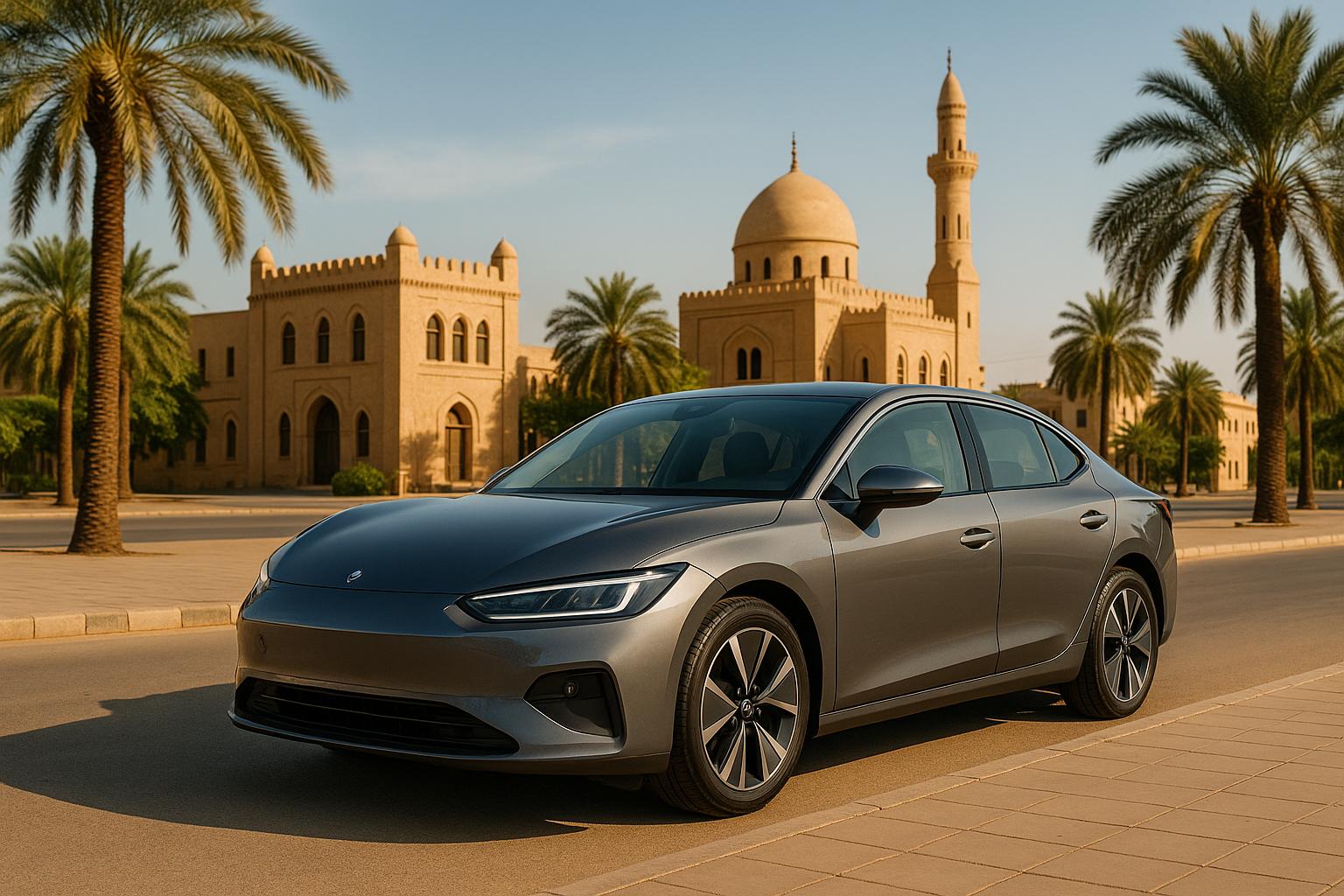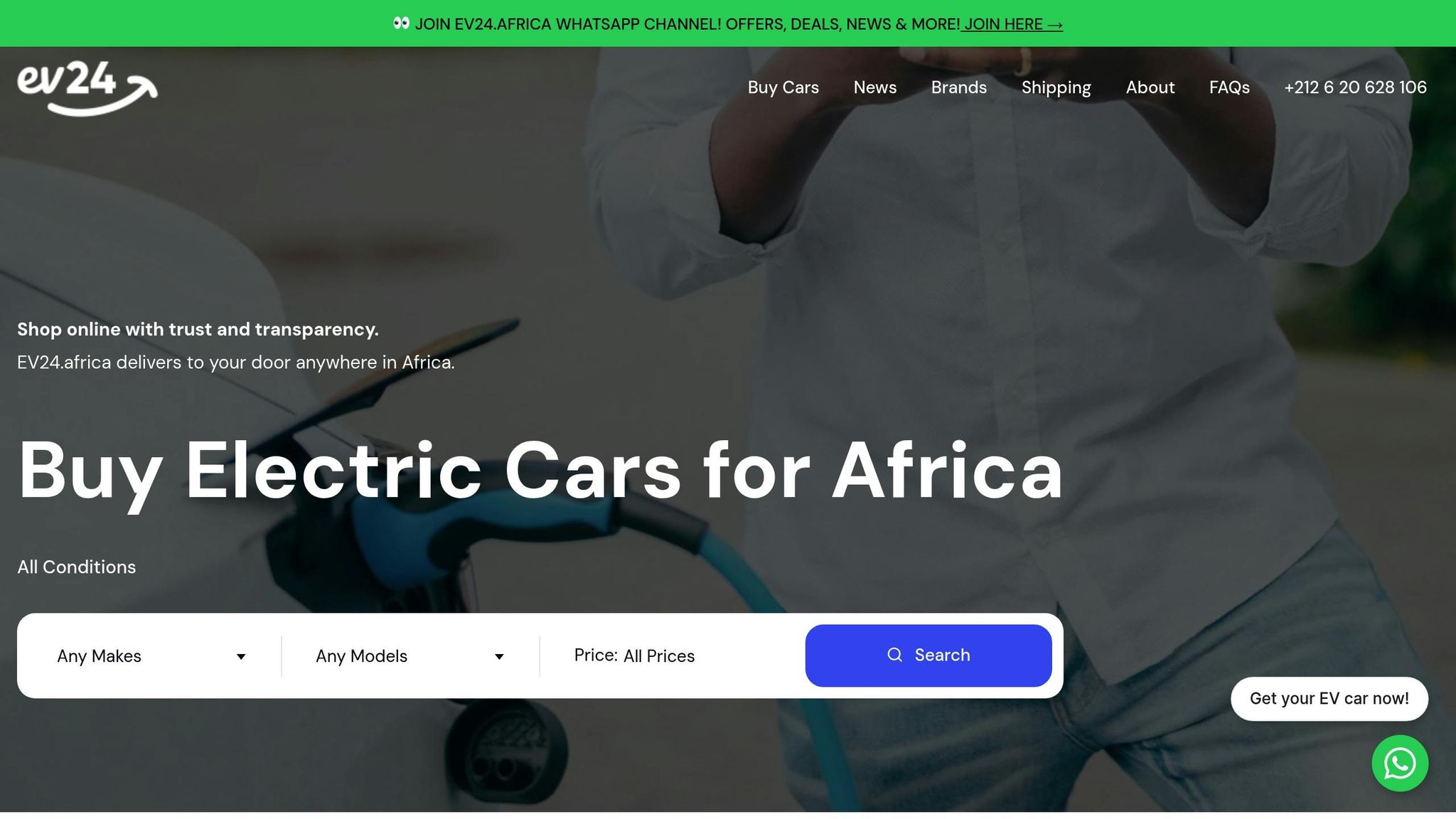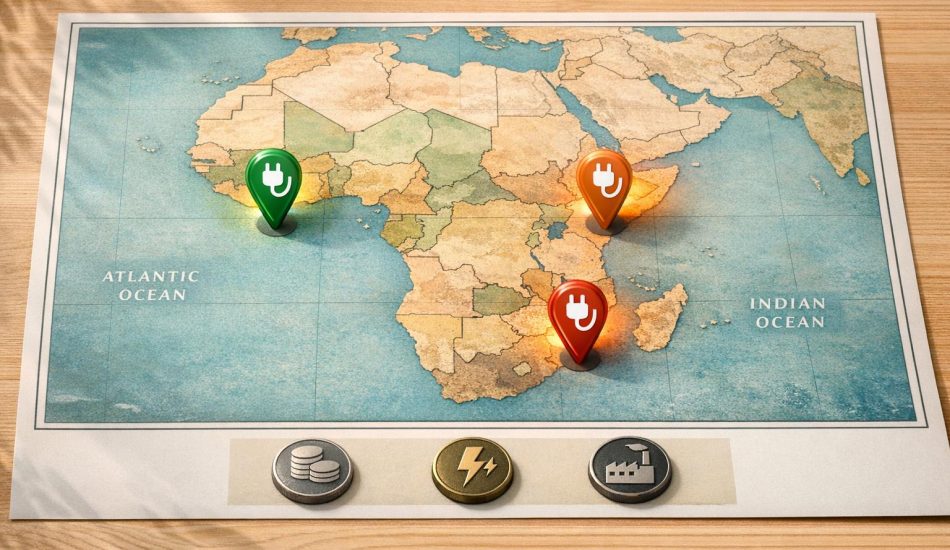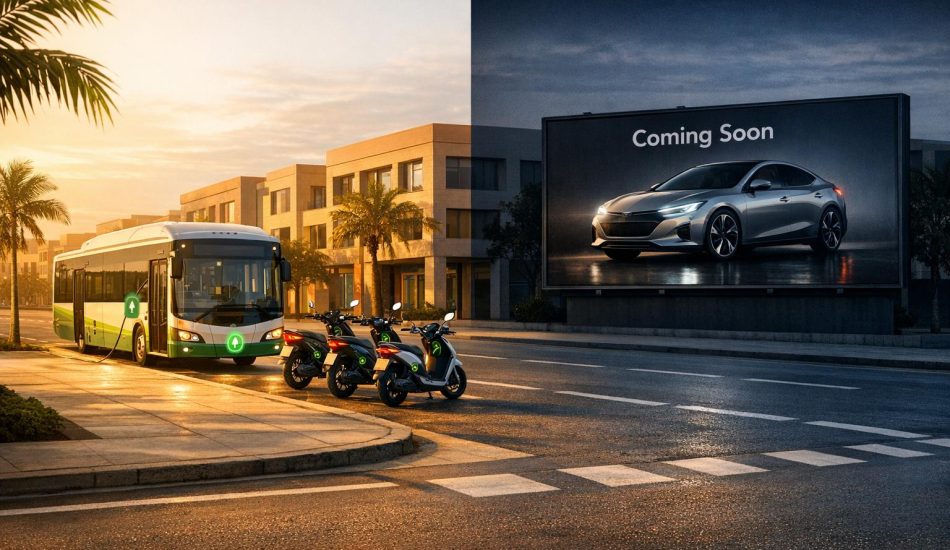
Electric vehicles (EVs) are gaining traction in Sudan, driven by rising fuel costs and interest in cleaner transportation. Key highlights for 2025 include:
- Growing EV Market: Cities like Khartoum are seeing more EVs, supported by new charging stations and solar projects.
- Top Brands Available: Tesla, BYD, Hyundai, and others are entering the market. Platforms like EV24.africa simplify buying with options for sourcing, customs, and delivery.
- Cost Challenges: Import duties (5% of vehicle value), VAT (10%), and shipping fees make EVs expensive. Used EV options are limited due to strict import rules.
- Models & Prices: Examples include the 2025 Leapmotor T03 at SDG 18,000,000 and BYD Dolphin at SDG 19,802,567.
- Buying Options: Purchase locally via dealerships like BuyCarSudan.com or online through EV24.africa. Both offer support for delivery and registration.
- Advantages: EVs save on fuel and maintenance and contribute to quieter, cleaner cities.
If you’re considering an EV in Sudan, platforms like EV24.africa streamline the process, offering a hassle-free way to own one.
Hybrid vs Plug in Hybrid vs Electric: what are the differences?
2025 Electric Car Models in Sudan
Sudan’s electric vehicle (EV) market is gearing up for expansion in 2025, offering buyers a wider variety of models to suit different needs. While specific details about models tailored for the Sudanese market are still emerging, global trends hint at vehicles that combine affordability, performance, and cutting-edge technology. Here’s a closer look at what to expect.
Top 2025 EV Models
Though exact model names and details for Sudan haven’t been confirmed yet, industry patterns suggest a mix of compact sedans, crossovers, and SUVs will dominate the lineup. These vehicles aim to cater to various lifestyles, from city commuters to families and even commercial users. For the latest updates, keep an eye on announcements from local dealerships and platforms like EV24.africa.
Model Features and Price Comparison
As new EV models roll out in Sudan, here are the key factors to consider when making a choice:
- Driving Range: A solid range is critical for both daily commutes and longer trips, especially as the country continues to develop its charging infrastructure.
- Charging Capabilities: Fast-charging options will be a game changer, reducing the time spent waiting to recharge.
- Climate Adaptability: With Sudan’s high temperatures, vehicles equipped with advanced battery management systems will ensure reliable performance even in extreme heat.
- Price and Value: Expect a variety of options, from budget-friendly models to high-end vehicles packed with extra features.
- Service and Support: A strong local service network will be vital for keeping maintenance costs low and ensuring long-term reliability.
As the market evolves, these features will play a central role in determining which models gain traction in Sudan. Keep a lookout for updates as more details become available.
Electric Car Prices in Sudan for 2025
The cost of electric vehicles (EVs) in Sudan is influenced by a mix of import regulations, taxes, and shipping fees. While the market for EVs is growing, steep import duties and associated expenses make widespread adoption a challenge. Below, we’ll break down the main cost factors and how they impact both new and used EV purchases.
EV Price Ranges
Electric car prices in Sudan highlight the challenges of an import-dependent market. High upfront costs make EVs inaccessible to most Sudanese consumers, confining ownership to wealthier individuals.
Import duties, set at 5% of the car’s CIF (Cost, Insurance, and Freight) value, combined with a 10% VAT applied to the CIF plus duties, significantly inflate the final price. Shipping costs add to the burden, with rates from Germany to Sudan ranging between $1,875 and $3,600. Local fees, including port handling and documentation, tack on an additional $1,500 to $2,500.
Interestingly, Tesla models were listed twice among the "Top 10 Most Popular Imported Vehicles in Sudan" from Germany in 2025, reflecting the brand’s strong appeal. However, this popularity also drives up prices for Tesla vehicles in the market.
There is some hope on the horizon, though. Emerging government policies suggest a focus on renewable energy, with potential plans to lower import tariffs for EVs. If implemented, this could gradually bring prices down.
New vs Used EV Costs
The high costs of new EVs, coupled with limited availability in the used market, make affordability a persistent issue. Sudan’s strict import rules prohibit private vehicles older than five years from entering the country, except for classic cars over 30 years old. This effectively excludes most used EVs from being imported.
Because of the five-year age limit, the selection of used EVs is extremely narrow. This limited supply drives up competition for eligible models, keeping prices high and eroding the savings typically associated with buying pre-owned vehicles.
The classic car exemption doesn’t help EV buyers either, as no electric models are old enough to qualify under the 30-year rule. This leaves consumers with only two options: relatively new used EVs (under five years old) or brand-new models – both of which come with hefty price tags due to Sudan’s import policies and associated costs.
sbb-itb-99e19e3
How to Buy Electric Cars in Sudan
With the rise of the electric vehicle (EV) market in Sudan, purchasing options are becoming more accessible. Whether you prefer dealing with local sellers or exploring online platforms like EV24.africa, there are convenient ways to find the right EV for you.
Buying from Local Dealerships
In Sudan, Khartoum serves as the hub for the local EV market, hosting a variety of dealerships and independent sellers. As of September 2025, BuyCarSudan.com featured 27 electric vehicles available in Khartoum from trusted sellers, highlighting the increasing availability of EVs locally.
For example:
- The 2025 Leapmotor T03 is listed at SDG 18,000,000.
- The 2025 BYD Dolphin is priced at SDG 19,802,567.
To start, browse listings on platforms like BuyCarSudan.com, which connects buyers with verified local sellers. Once you find a car that interests you, reach out to the seller to discuss important details like the vehicle’s history, warranty coverage, and available services. Scheduling a test drive is also a smart move to ensure the car meets your expectations. Additionally, direct communication with sellers often allows room for price negotiation, as many local dealers are open to some flexibility.
If you’d rather avoid in-person visits and prefer a seamless online experience, EV24.africa might be the better option.
Buying Online Through EV24.africa

For those who want a streamlined online process, EV24.africa offers a simple and efficient way to purchase electric vehicles across Africa, including Sudan. The platform provides a wide selection of EVs with detailed specifications and clear pricing.
Here’s how it works:
- Visit EV24.africa to explore available models.
- Request a quote for your chosen vehicle.
- The platform takes care of sourcing, customs clearance, and local registration, ensuring compliance with Sudan’s import rules.
EV24.africa also supports buyers with transparent pricing, flexible payment options, and personalized assistance. For additional help, you can directly chat with an EV24 expert via WhatsApp, making the process even more convenient.
Whether you choose to browse local dealerships or go fully online, Sudan’s growing EV market provides plenty of options to suit your needs.
Delivery and Support Services in Sudan
After purchasing an electric vehicle (EV), understanding delivery options and support services can make ownership much easier. Sudan’s growing EV market offers multiple ways to get your car delivered and maintained. Let’s look at the key shipment methods and support services available.
EV Delivery Options
When it comes to shipping EVs to Sudan, you have a few choices: Roll-on/Roll-off (RORO), Full Container Load (FCL), and shared container services. Each option has its own cost and convenience factors.
- RORO Shipping: This is one of the most popular methods. For operational vehicles, ocean freight rates from Germany to Port Sudan start at $1,875.
- Full Container Load (FCL): If you’re looking for added protection, FCL allows you to ship your EV in a dedicated container, along with personal belongings. However, this option may come with extra costs due to regulations, such as the need for specialized documentation or refrigerated containers for certain EVs.
- Shared Container Services: This is a budget-friendly option for non-operational vehicles. However, delays can occur while waiting for the container to fill. The R-RAK shared container service charges the same for electric and gasoline cars, and you can use extra space in your EV for additional items.
When importing an EV, expect to pay a 5% customs duty on the CIF value, a 10% VAT on the CIF value plus duties, and local fees ranging between $1,500 and $2,500. It’s worth noting that some major RORO carriers, like Hoegh Autoliners and Wallenius Wilhelmsen, only accept new EVs. Others, such as K-Line, will ship second-hand EVs as long as they’re in good condition and have a sufficient battery charge.
For added convenience, platforms like EV24.africa handle sourcing, customs clearance, and registration, streamlining the entire delivery process.
Maintenance and Support Services
One of the advantages of EVs is their low maintenance needs, thanks to fewer moving parts. Most factory warranties cover 8 to 10 years or 100,000 miles, with some manufacturers offering even longer coverage. For instance, Kia, Hyundai, and Genesis provide warranties for up to 10 years or 100,000 miles, while the Mercedes Benz EQS extends coverage to 10 years or 155,000 miles. These warranties often include battery replacement if capacity falls below 60–70% of the original level.
In Sudan, Kia Sudan offers comprehensive "Service & Care" programs, including warranty coverage for their eco-friendly and electric models. While EV-specific maintenance centers are still emerging, authorized dealerships are equipped to provide essential after-sales support.
Routine maintenance for EVs is straightforward and includes checks on tires, wiper blades, filters, brake fluid, and suspension. Thanks to regenerative braking, brake pads last longer, reducing the frequency of replacements. Many automakers also offer roadside assistance packages, covering services like towing and tire repair kits, as EVs typically don’t come with spare tires.
Before committing to an EV, it’s a good idea to consult authorized dealerships for details on after-sales service packages, warranty terms, and spare parts availability. As Sudan’s EV market continues to grow, clear delivery options and reliable support services are key to making EV ownership a smooth experience.
Conclusion
Sudan’s electric vehicle (EV) market is steadily expanding, offering a range of options to suit different budgets – from affordable models to high-end choices. Buyers can explore both brand-new and certified pre-owned vehicles, giving them flexibility based on their needs.
Owning an EV in Sudan comes with clear financial perks. For example, purchasing a $30,000 EV could result in savings of nearly $19,000 thanks to tax exemptions. Add to that the reduced costs of fuel and maintenance, and it’s easy to see why EVs are a smart long-term choice. To make accessing these benefits easier, there’s a dependable solution available.
Enter EV24.africa, a platform designed to simplify the process of buying EVs for Sudanese customers. They take care of everything – sourcing vehicles, handling customs clearance, and ensuring delivery – so buyers don’t have to navigate the complexities of importing. As EV24.africa puts it:
"Navigating the complexities of vehicle importation can be daunting. That’s why EV24.africa manages the entire process on your behalf, adhering to international commercial terms (Incoterms) that best suit your requirements."
From managing customs paperwork and securing tax exemptions to arranging shipping and offering expert advice, EV24.africa ensures a seamless experience. They even provide delivery options across Sudan through Port Sudan, making their services accessible no matter where you are. With transparent pricing and comprehensive support, they remove the stress from the buying process.
Whether you’re upgrading your ride or purchasing your first EV, Sudan’s growing market – backed by platforms like EV24.africa – makes switching to electric vehicles easier than ever.
FAQs
Are there any government policies in Sudan that could make electric vehicles more affordable in the future?
Sudan is starting to look into ways to promote electric vehicle (EV) adoption as part of its efforts to prioritize sustainable transportation. Although concrete incentives like tax reductions or lower import duties haven’t been fully rolled out yet, the government has expressed interest in nurturing the EV market.
Down the line, possible strategies might involve financial perks like subsidies or tax credits. These kinds of initiatives have worked well in other countries by reducing the upfront cost of EVs, which could make them more affordable and appealing to buyers in Sudan.
How does Sudan’s hot climate impact electric vehicle performance, and what features should buyers consider for better reliability?
Sudan’s scorching temperatures can take a toll on electric vehicles, speeding up battery wear, reducing range, and affecting overall performance. High heat contributes to faster battery degradation and increases internal resistance, which can lead to a shorter battery lifespan and decreased efficiency.
To keep EVs running reliably in such conditions, it’s crucial to choose models equipped with active thermal management systems and effective cooling technologies. Features like advanced climate control and multi-zone temperature regulation can also play a big role in maintaining performance and safeguarding the vehicle’s components against extreme heat.
What should I consider when deciding between buying an electric car from a local dealership or an online platform like EV24.africa?
When choosing between a local dealership and an online platform like EV24.africa, there are a few important things to weigh:
- Seeing the car up close: Local dealerships give you the chance to inspect the vehicle in person and take it for a test drive. This can be especially comforting if you’re new to electric vehicles and want to feel confident about your purchase.
- Convenience and variety: Online platforms often let you browse a much wider selection of models, all from the comfort of your own home. No need to drive around town or stick to limited local inventory.
- Pricing approach: Many online platforms stick to fixed, no-haggle pricing, which can simplify the buying process. On the other hand, dealerships may leave room for negotiation, which could work in your favor if you’re skilled at it.
- Safety and trust: If you’re leaning toward buying online, make sure the platform has a solid reputation and offers secure payment methods to avoid any potential issues.
In the end, it comes down to what feels right for you – whether that’s the in-person experience of a dealership or the ease and range of options an online platform can provide.




